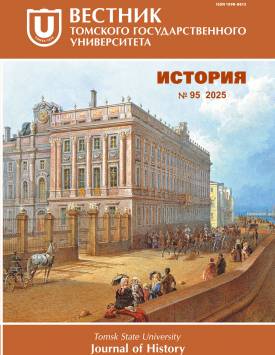Problems of the comparative-historical method and historical analogies in the publications of G.S. Fridlyand
The comparative historical method has gained immense popularity at the present stage of development of historical science. The reverse side of this popularity is the threat of its vulgarization and, accordingly, application errors. The purpose of this study is to clarify the views of the early Soviet historian Grigorij Samojlovich Fridlyand on the problems of comparative historical research. The relevance of such consideration is given by the fact that the historiography of historical science methodology has not yet been fully formed, as well as the history of the development of individual research methods. The review was carried out on the materials of articles, reviews, polemical notes and other periodic publications by G.S. Fridlyand in the leading periodicals of that time. The study revealed that on the basis of discussions around the similarities and differences between the French Revolution and the October Revolution, Fridlyand managed to develop a number of key issues of the comparative method: the distinction between comparisons and analogies, the main lines of comparison of historical phenomena and processes, the possibility of comparisons in the chronological context, the comparison of particular differences in similar objects and single matches for dissimilar objects. When considering the views of Fridlyand, special attention was paid to accusations of opportunism by modern researchers, as well as the relationship between his historical and philosophical views. Summarizing the publications of this author, a number of fundamental conclusions were made. The first of these was a statement of the profound influence that Marxism and its system of philosophical categories had on Fridlyand in resolving particular questions of discipline. Only this system gives the key to understanding the apparent contradictions in his constructions and allows explaining why in each specific case the author comes to certain conclusions while evaluating this or that historical analogy. A similar approach, associated with the use of a system of categories, may be relevant for modem researchers who tend to get confused about the identity and distinction of historical processes and phenomena. It is impossible not to note the purely applied significance of a number of ready-made conclusions, such as, for example, Fridlyand's criticism of the modernization of history on the example of attributing analogies to the phenomena of the past with the phenomena of current or recent political reality. In conclusion, it is noted that while the history of methodology development and specific examples of the use of various research techniques are still poorly reflected in studies, an analysis of the methodological views of historians from the past will be of great importance for training new personnel in historical science and further understanding of the conditions for its development. The author declares no conflicts of interests.
Keywords
historical materialism, methodology of history, Marxism, Fridlyand, comparative studiesAuthors
| Name | Organization | |
| Mochalov Dmitrii P. | Orenburg State Pedagogical University | dosoldschool@yandex.ru |
References

Problems of the comparative-historical method and historical analogies in the publications of G.S. Fridlyand | Tomsk State University Journal of History. 2025. № 95. DOI: 10.17223/19988613/95/19
